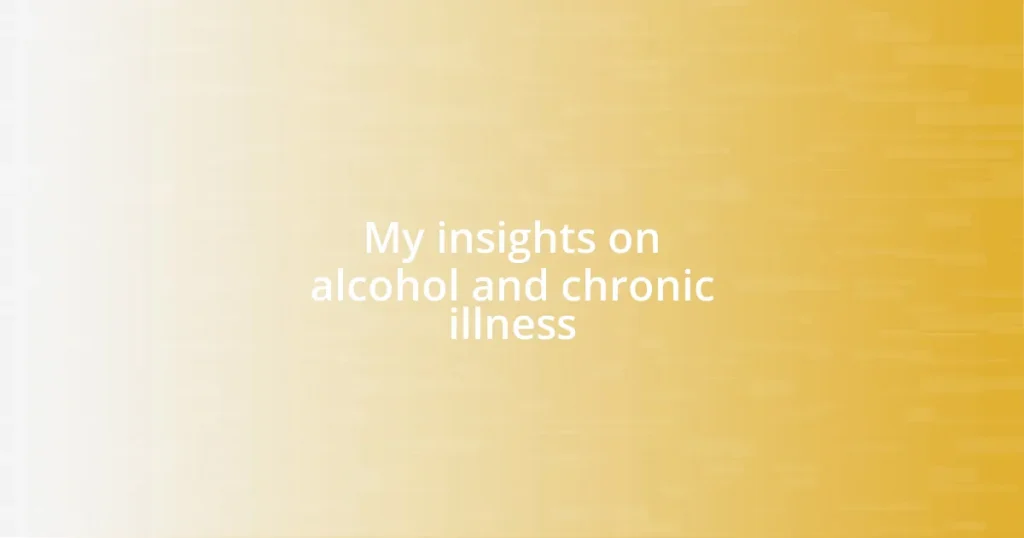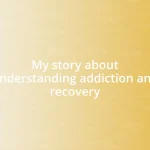Key takeaways:
- Alcohol can worsen symptoms of chronic illnesses, complicating management and leading to unpredictable health effects.
- It’s essential to recognize both the physical and emotional impact of alcohol, as it can exacerbate conditions like depression and fatigue.
- Strategies for reducing alcohol consumption include setting boundaries, exploring non-alcoholic alternatives, and practicing mindfulness regarding drinking habits.
- Seeking support, whether through community or professional counseling, is crucial for addressing alcohol-related issues and fostering a healthier relationship with alcohol.
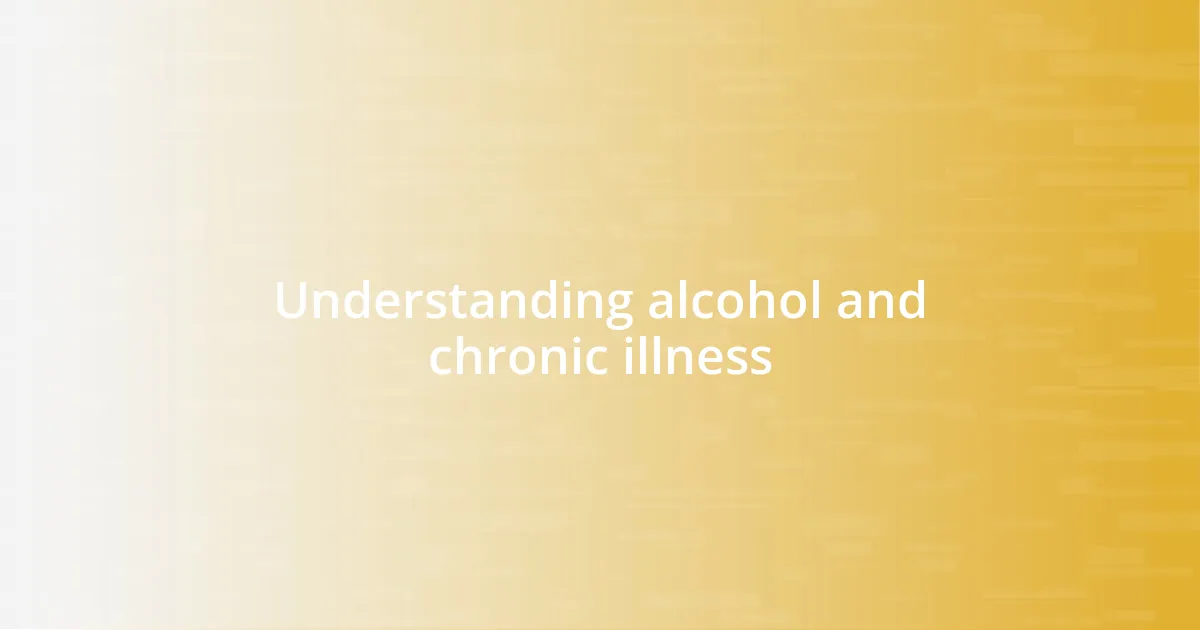
Understanding alcohol and chronic illness
Alcohol can significantly impact those with chronic illnesses, often complicating their conditions. I’ve seen friends struggle with this; they want to enjoy a drink, but alcohol can exacerbate symptoms, creating a push-and-pull that’s hard to navigate. Isn’t it puzzling how something so social and commonplace can feel like such a minefield when health is at stake?
From my experience, understanding the relationship between alcohol and chronic illness is crucial. For instance, I once had a coworker with rheumatoid arthritis who believed a glass of wine eased her pain. Sadly, she later discovered that it led to increased inflammation and flare-ups. It’s moments like these that remind us that our bodies respond differently to substances like alcohol, and it’s essential to listen to what they’re saying.
Considering the emotional toll, it’s not just about the physical effects; there’s a social dimension too. Imagine attending a gathering where everyone is enjoying a drink, and you can’t partake due to health concerns. It’s isolating, isn’t it? I’ve felt that sting of exclusion, which is why recognizing the effects of alcohol on chronic conditions is so vital for maintaining both physical and emotional well-being.
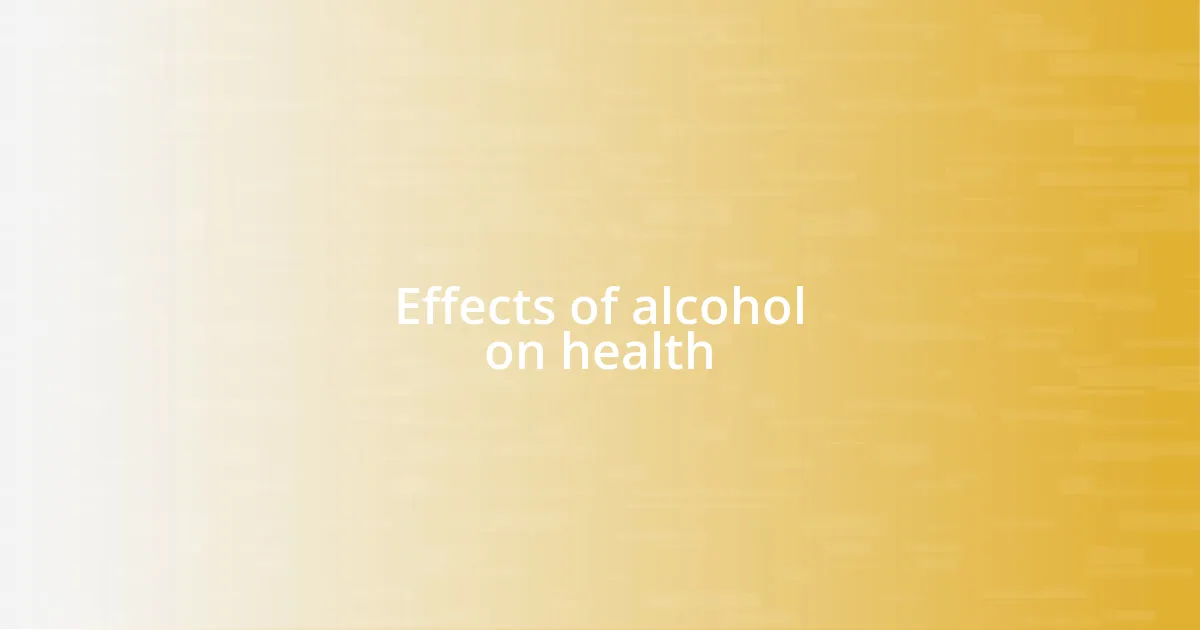
Effects of alcohol on health
When it comes to health, the effects of alcohol can be multifaceted. I remember a time when a close friend, who was managing diabetes, decided to indulge in cocktails during a weekend outing. Initially, he felt relaxed and carefree, but by the end of the night, he struggled with fluctuating blood sugar levels. The consequences were immediate—a hangover mixed with anxiety about his condition. This experience highlighted how alcohol can interfere with medical management, leading to unpredictable outcomes.
One crucial aspect I often reflect on is how alcohol affects liver health, especially for those with chronic illnesses. I’ve met individuals with liver conditions who viewed alcohol as a way to unwind. However, I often encourage them to reconsider; even small amounts can trigger serious complications. It’s a reminder that moderation is key, but complete avoidance may be necessary in some cases. I’ve seen firsthand how difficult these decisions can be and the importance of seeking guidance from healthcare professionals.
In considering the larger picture, the impact of alcohol extends beyond immediate physical symptoms; it can alter mental health too. I recall discussing this with someone battling depression who believed that a drink would help soothe her mood. Sadly, alcohol is a known depressant, and it often creates a cycle of temporary relief followed by deeper lows. Recognizing how alcohol influences both the body and mind is essential for anyone navigating chronic health challenges.
| Health Aspect | Effect of Alcohol |
|---|---|
| Blood Sugar Regulation | Fluctuates levels, possibly leading to hyperglycemia or hypoglycemia |
| Liver Health | Can worsen liver function and exacerbate existing liver diseases |
| Mental Health | Can lead to increased feelings of depression and anxiety |
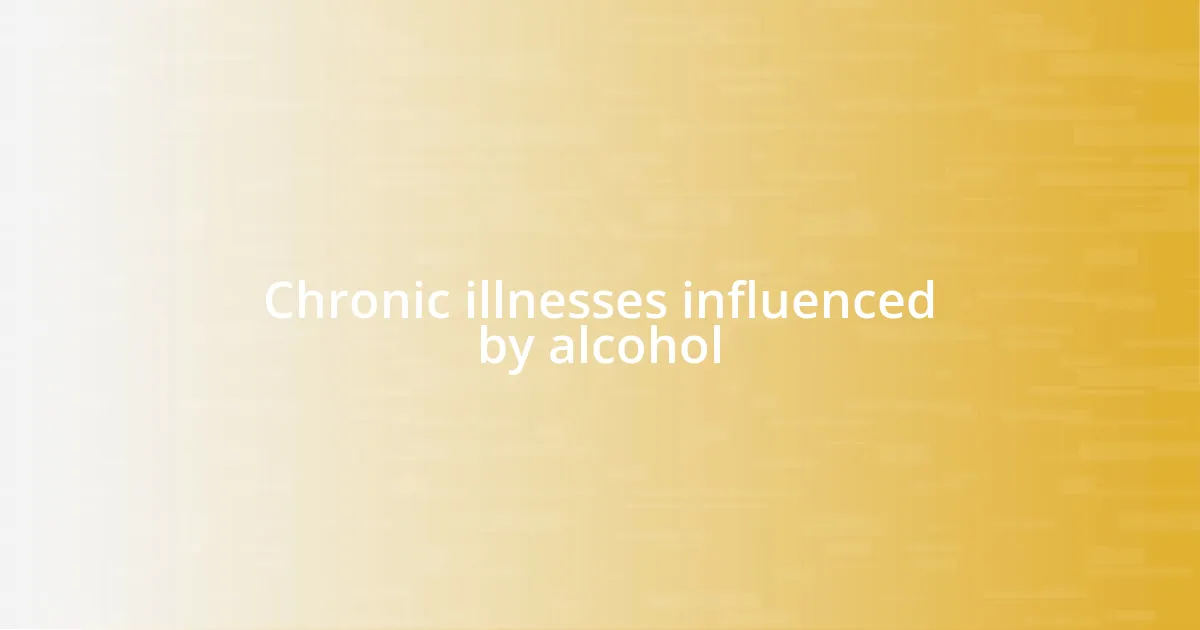
Chronic illnesses influenced by alcohol
When it comes to chronic illnesses influenced by alcohol, the effects can be profound and unpredictable. I remember chatting with a neighbor who dealt with multiple sclerosis. She shared how she once enjoyed an occasional drink, thinking it was harmless. Unfortunately, she quickly learned that even a small amount of alcohol could trigger fatigue and make her symptoms worse. This experience illuminated for me just how differently alcohol can interact with various chronic conditions.
- Individuals with gastrointestinal issues may experience worsened symptoms like nausea and digestive distress after drinking.
- Those diagnosed with heart disease could face elevated risks, as alcohol can lead to irregular heartbeats and increased blood pressure.
- For people with chronic pain, alcohol can mask discomfort temporarily but ultimately lead to heightened sensitivity and flare-ups.
- Asthma sufferers might find that drinking can constrict airways and trigger asthma attacks.
- Lastly, for anyone navigating autoimmune diseases, even minimal alcohol intake may provoke an immune response that escalates inflammation.
Reflecting on these points, I can’t help but think about the need for awareness and caution. It’s essential to realize that the decision to consume alcohol can carry heavy consequences for those managing chronic illnesses. I sometimes wonder if society could bridge the gap between social norms and personal health by fostering more understanding around this topic.
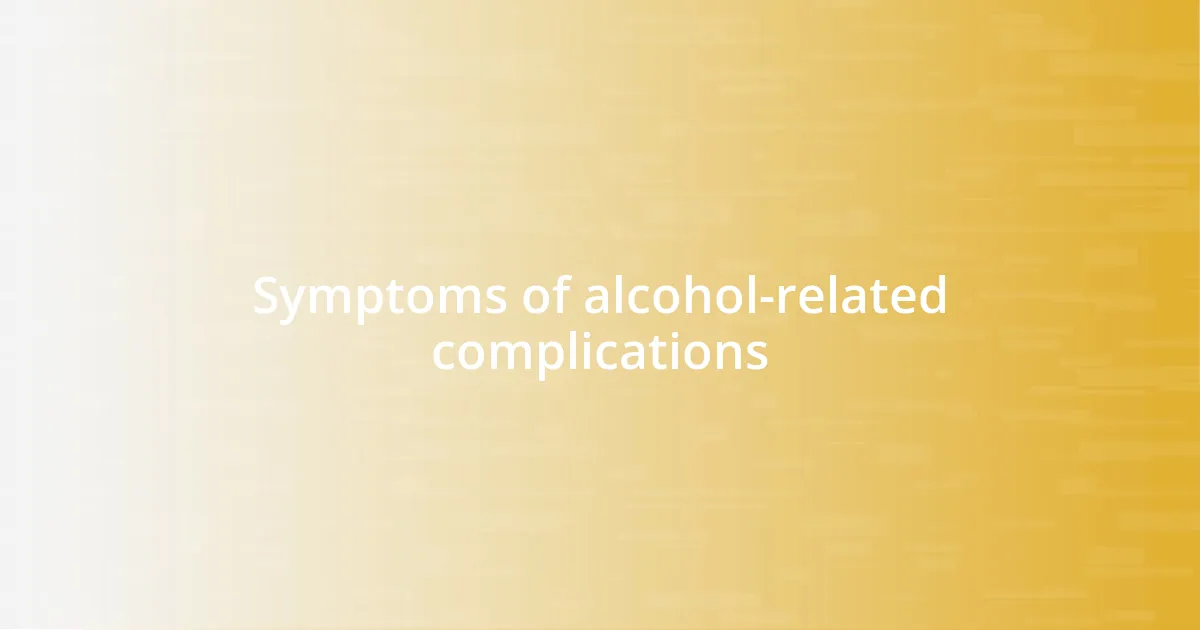
Symptoms of alcohol-related complications
One of the most alarming symptoms of alcohol-related complications that I’ve encountered is the sudden onset of nausea and vomiting. I remember a time when a family member, who was trying to manage their weight, opted for a few beers at a gathering. Almost instantly, they felt queasy and had to excuse themselves from the party. This scenario not only cast a shadow on what should have been a joyful occasion but also underscored how alcohol can wreak havoc on the digestive system, leading to complications that no one anticipates.
Beyond physical reactions, there’s a profound emotional toll alcohol can take. I once spoke with someone who experienced intense fatigue and mood swings after drinking, particularly when trying to balance their mental health. They shared their frustration about how, instead of feeling relaxed, they ended up feeling emotionally drained and irritable. This interaction made me realize that alcohol can create an emotional rollercoaster, often masking underlying issues rather than resolving them. Isn’t it fascinating how a substance meant for relaxation can lead to such turmoil?
Another symptom worth noting is the impact on sleep patterns. I’ve had conversations with friends who believe that a nightcap helps them sleep better. Yet, I pointed out that alcohol often disrupts the sleep cycle, leading to restless nights and grogginess the next day. It turns out that the very thing they thought was a remedy for insomnia could be making the problem worse. Wasn’t it surprising for them to discover that sleep quality is as vital as the quantity of hours? This kind of insight can be eye-opening, encouraging people to think critically about their choices.
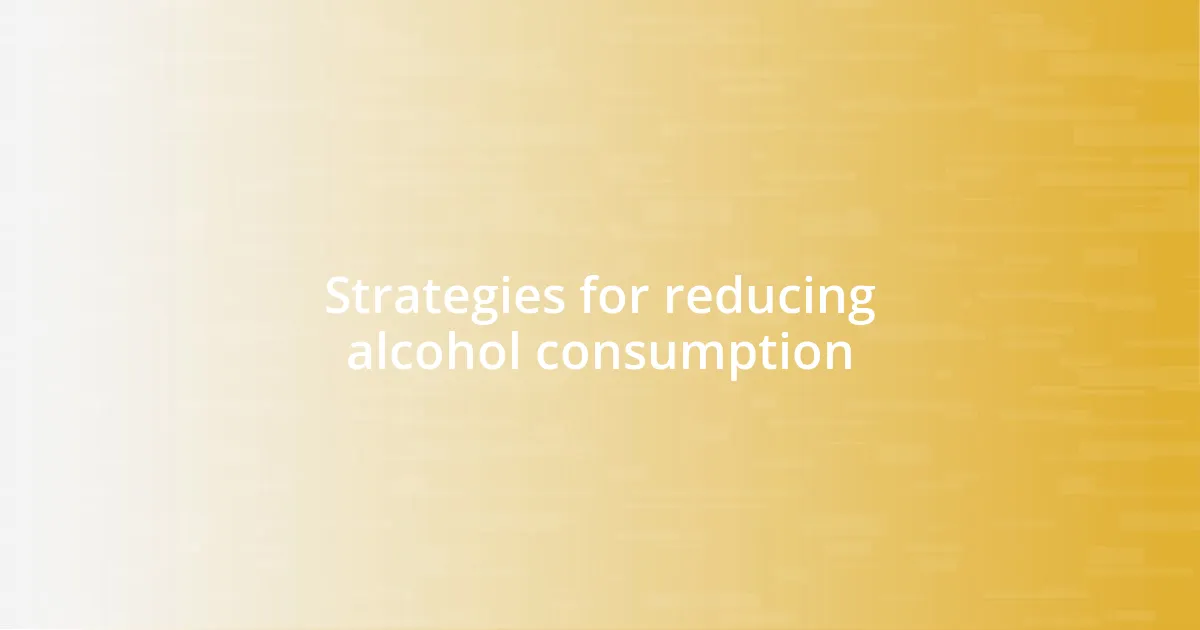
Strategies for reducing alcohol consumption
One effective strategy I’ve found for reducing alcohol consumption is setting clear boundaries. For instance, I decided to designate certain days of the week as alcohol-free, and it really changed my perspective. This small shift not only helped my body feel healthier but also allowed me to savor the moments when I did choose to enjoy a drink, enhancing that experience instead of making it a habit.
Another approach is to explore non-alcoholic alternatives. I remember a dinner party where I was pleasantly surprised by the wide range of delicious mocktails offered. It felt liberating to participate fully in the social atmosphere without the side effects of alcohol. Have you ever tried a non-alcoholic beer or a sparkling water with fresh fruit? They can be surprisingly satisfying, and incorporating these options can help ease the transition away from alcoholic beverages.
Lastly, I’ve discovered the power of mindfulness when it comes to drinking. Reflecting on how alcohol makes me feel, both physically and emotionally, has motivated me to cut back. I often ask myself, “Is this drink really making me happier?” This simple question has pulled me away from automatic consumption and encouraged me to be present in the moment, allowing me to engage more fully with my surroundings and the people I care about. Have you considered how your emotions influence your drinking habits? It’s a game changer for many!
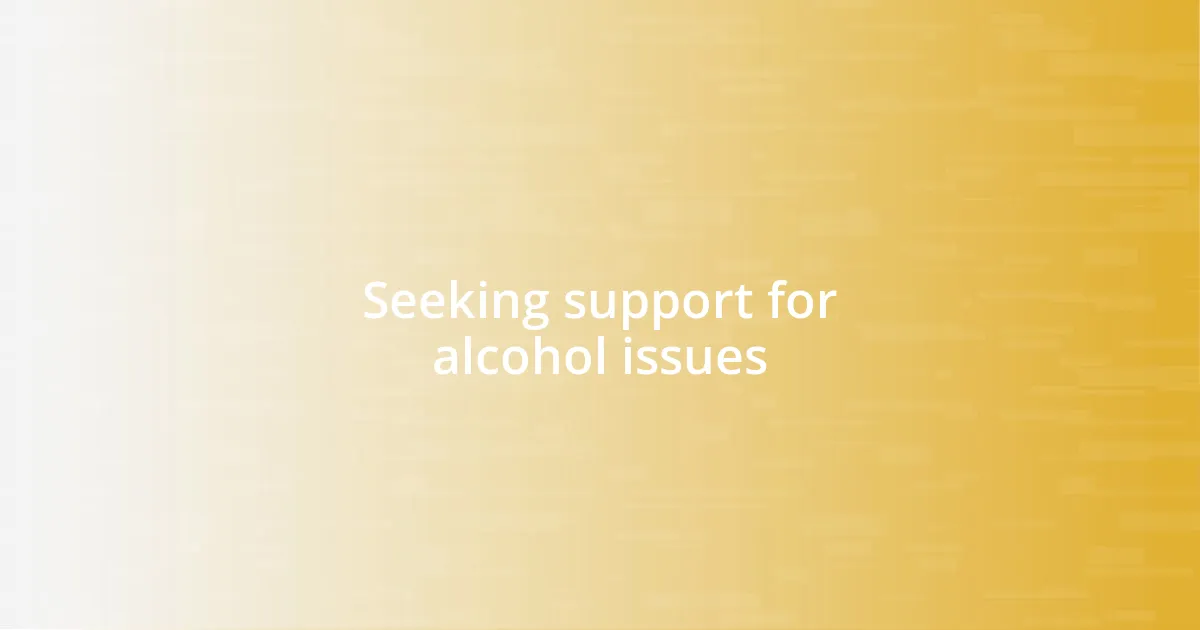
Seeking support for alcohol issues
Recognizing when to seek support for alcohol issues can be a difficult realization. I recall a moment when I hit a wall – I was feeling exhausted and found that my regular drinking wasn’t just a social activity; it was a way to cope with stress. Reaching out for help can be intimidating, but I realized how liberating it was to share my experiences with others who understood what I was going through. Have you ever thought about how powerful it could be to exchange your story with someone who’s been there too?
Support groups can be incredibly beneficial, offering a sense of community and understanding. I once attended a local meeting, and what struck me was the immediate connection with people from different walks of life who faced similar struggles. Listening to their journeys made me feel less isolated and more empowered to take control of my own relationship with alcohol. It’s interesting how simply knowing you’re not alone can spark a change, isn’t it?
Moreover, professional counseling has played a pivotal role in many people’s recovery journeys. When I finally decided to speak with a therapist about my drinking habits, the insights I gained were invaluable. They helped me unravel the deep-seated emotions tied to my drinking, making me realize that sometimes our choices stem from unresolved feelings. Have you considered how exploring these emotions could lead to a healthier relationship with alcohol? It truly opens up a path to understanding and healing.










